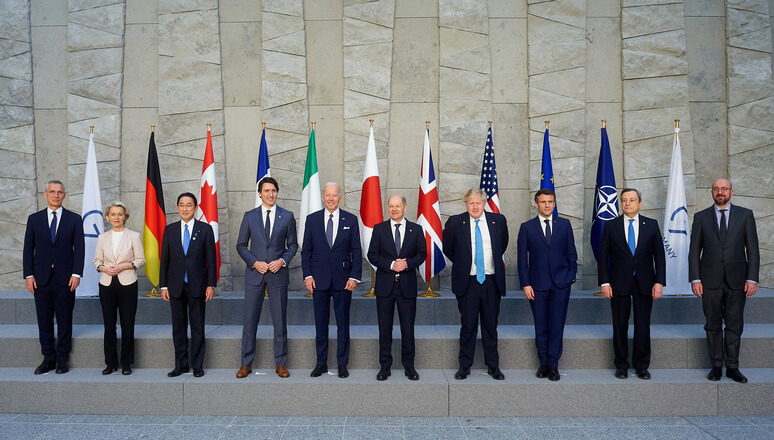On Thursday, the Group of Seven (G7) leaders congregated at the North Atlantic Treaty Organization (NATO) headquarters in Brussels to reiterate their collective stance against Russia’s ongoing war in Ukraine, asserting support for Kyiv while announcing more punitive measures on Moscow.
The meeting took place after the extraordinary NATO summit, which was organised by Germany, the current holder of the G7 presidency. The meeting saw attendance from heads of state of the other G7 members—Canada, France, Italy, Japan, the United Kingdom (UK), and the United States (US)—along with the top leaders of the European Union (EU), a ‘non-enumerated’ member of the G7 that does not hold the rotating presidency.
I was proud to meet with my fellow G7 leaders today. We remain resolved to stand with the Ukrainian people and government who heroically resist President Putin’s military aggression and war of choice against their sovereign nation. pic.twitter.com/CmkqFcfaYj
— President Biden (@POTUS) March 24, 2022
In a joint statement, the G7 leaders affirmed their commitment to holding Russia accountable for its military aggression in Ukraine under the ordinance of international law. They emphasised their support for the International Criminal Court’s inquiry and investigation into Russian war crimes in Ukraine, noting how “appalled” they were by Moscow’s attacks on Ukrainian civilians, particularly in the southern port city of Mariupol. They stressed that they will work in unison to collect evidence regarding war crimes committed by the Russian military.
The leaders highlighted that the Russian government is “obligated to immediately comply” with the International Court of Justice’s orders that call for suspension of military activity and withdrawal of Russian troops and equipment from the Ukrainian territory. The G7 extended this warning to the Belarusian government and all other countries as well.
Ukraine: Macron calls on Russia to avoid 'famine' in vulnerable countries: Speaking after G7 and NATO summits, French President Emmanuel Macron urges Moscow to show responsibility by allowing farm production in Ukraine, which is a major cereal grain exporter. Without that, pic.twitter.com/kWQiqCI7wH
— worldnews24u (@worldnews24u) March 25, 2022
Furthermore, the statement called Russia to abide by its obligations to international treaties, urging the Russian forces to not attack nuclear sites in Ukraine, and to refrain from using chemical, biological, and nuclear weapons.
Talking about malicious Russian cyber activity, the leaders underscored their support for Ukraine’s cyber defence, warning that any actor that engages in “destructive, disruptive, or destabilising activities in cyberspace” will be held accountable by the G7.
The G7 leaders also vowed to reduce their energy dependence on Russian gas, oil, and coal imports, adding that they will provide support to countries that gradually reduce Russian energy imports. They highlighted that the Organization of the Petroleum Exporting Countries (OPEC) “has a key role to play” and they called for “responsible behaviour” from oil and gas exporting nations. Earlier this week, Russian President Vladimir Putin announced that Moscow will no longer accept Dollar or Euro payments from “unfriendly states” for its sale of natural gas—all G7 countries and the EU come under Russia’s list.
#Zelensky says he spoke with #Macron and #Rutte before #G7, #NATO and #EU summits pic.twitter.com/CbYu8CPzvD
— KyivPost (@KyivPost) March 23, 2022
Amid this energy crisis, the leaders also underlined their commitment to the Paris agreement and the Glasgow climate pacts, adding that the current energy crunch has increased their determination to phase into clean energy.
Finally, towards the end of their statement, the G7 leaders singled out Putin’s “unilateral choice to wage war in Europe” as the reason why the global economy remains at risk, adding that this risk is further increased by the implications of Putin’s war on global food security. The G7 stressed that their sanctions include protection mechanisms to help avoid a global food crisis. The grouping also asked relevant multilateral organisations, such as the World Food Programme (WFP), the Food and Agriculture Organization (FAO), and the World Trade Organization (WTO), to take suitable actions against Russia.
Separately on Thursday, the G7 and the EU released a detailed note on additional sanctions levelled against more than 400 Russian elites and politicians, and 48 large Russian defence companies. The Western leaders imposed “full blocking sanctions” and severe restrictions on the Russian Central Bank’s ability to use international reserves, particularly gold.

